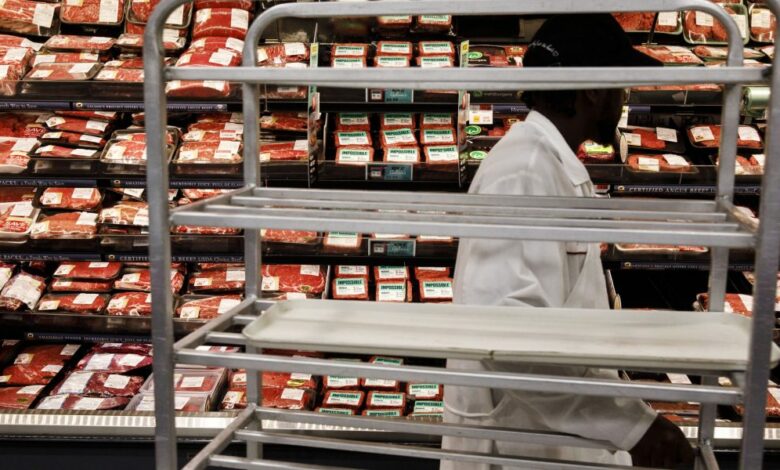France bans calling plant-based meat ‘steak’—and 21 other words


Vegetarian steak au poivre? Actually, France would like you to call it ‘plant-based meat alternative au poivre’ instead.
The French government issued a decree on Tuesday banning the use of 21 terms, including “steak” and “fillet,” from being used to describe plant-based products up for sale or distribution. “Burger,” however, is not on the list.
The new rule, created in an effort to prevent confusion over which products are actually plant-based meat alternatives, will go into effect in three months. It will only apply to products made in France. The French ministry of Agriculture and Food did not respond to Fortune’s request for comment.
An earlier version of this decree was introduced and shot down in court last June because its language was too vague and it did not offer enough time for plant-based brands to make necessary changes.
“It is an issue of transparency and loyalty which meets a legitimate expectation of consumers and producers,” French Agriculture Minister Marc Fesneau said in a statement to Reuters.
The decree coincides with the growing hunger for plant-based meat alternatives in Europe. Beyond Meat had soaring fourth-quarter earnings, in part because of its strong international sales, which included a 22% bump in retail sales. A GFI Europe analysis of NielsenIQ retail sales data found a 22% increase in plant-based product sales between 2020 and 2022 across 13 European countries. Plant-based meat saw 2 billion Euros in sales in 2022, accounting for 6% of the pre-packaged meat market.
But while the fake meat industry is thriving in Europe, livestock farmers are suffering. Farmers across the EU are protesting falling prices, and as Europe’s No. 1 beef producer, France is under even more pressure to maintain the health of the industry. The French government’s restrictions on plant-based meats is, in part, a move to assuage that anger and lend a helping hand. The decree follows similar moves by the Italian government, which last year banned the production of lab-grown meat and the use of meat-related words to market plant-based alternatives in order to protect the country’s meat industry.
But in a bid to protect the farmers and manufacturers, these rules will likely confuse consumers, trademark lawyer Brett Lewis told Fortune.
“It’s hard to describe what the products are without using the word….because that’s the purpose and the function that they serve in people’s diets,” he said.
Instead, French plant-based product producers will have to get creative with their language. Lewis, a longtime vegetarian, provided a few suggestions: Instead of sausage, have some “extruded soy fibers in a casing.” Want a steak? What about a “pink-ish looking vegetable protein product”?
European nations have a long history of trying to protect the industries producing premium products. Individual countries as well as the European Union as a whole have gone to great lengths to regulate the branding and product integrity of some of its best-known products to benefit its manufacturers.
The EU’s literal Champagne problems
In many cases—though not in the case of plant-based meat alternatives—the EU’s protections over its agricultural products take the form of quality schemes, such as protected designation of origin, which registers products to the place or tradition with which they were traditionally produced. It’s the indication given to Champagne, the sparkling white wine produced only in the region of northern France for which it is named.
These standards, the European Commission argues, are crucial in negotiating trade and protecting intellectual property, allowing manufacturers to have appropriate compensation for products.
To see the extent to which the EU will go to protect these indications, look no further than the over 2,300 cans of Miller High Life that Belgian Customs crushed in April, simply because the beer bore the slogan “the Champagne of Beers.”
The General Administration of Belgian Customs destroyed the brew shipment, originally on its way to Germany, because products that violate protected-designation-of-origin laws are treated as “counterfeit goods.”
After the ordeal, Charles Goemaere, the managing director of the Comité Champagne, a collective of Champagne industry professionals, expressed his contentment with the decision and wanted to “congratulate the Belgian Customs for their vigilance with regard to the Champagne designation and for their responsiveness,” according to a statement to Food & Wine.
The EU has even tried to pressure U.S. cheesemakers into abiding by food labeling standards, despite having little authority to do so. In 2014, EU spokesperson Roger Waite indicated to the Associated Press that limiting U.S. cheesemakers’ use of “Parmesan,” among other region-specific labels, was “an important issue for the EU,” suggesting the green-labeled shakeable cheese dust could be confused for the aged hard cheese produced in Parma. U.S. cheese companies had tasted victory in March, when a federal appeals court ruled they were able to label certain cheese as “gruyere,” even if it wasn’t produced in a certain region of France and Switzerland.
Plant-based meat substitutes won’t face the same challenges with EU quality schemes as these other brands, Lewis said, but they’ll experience a similar pressure: Europe wants to protect its own agriculture products and workers, and will do so by whatever means necessary.
As the buzz around plant-based proteins in Europe continues to grow, so, too, will the debate over what to call these products, Lewis posited.
“It’s probably something which is going to become a more hotly contested issue over time as the plant-based food producers gain market share,” he said.
Source link




